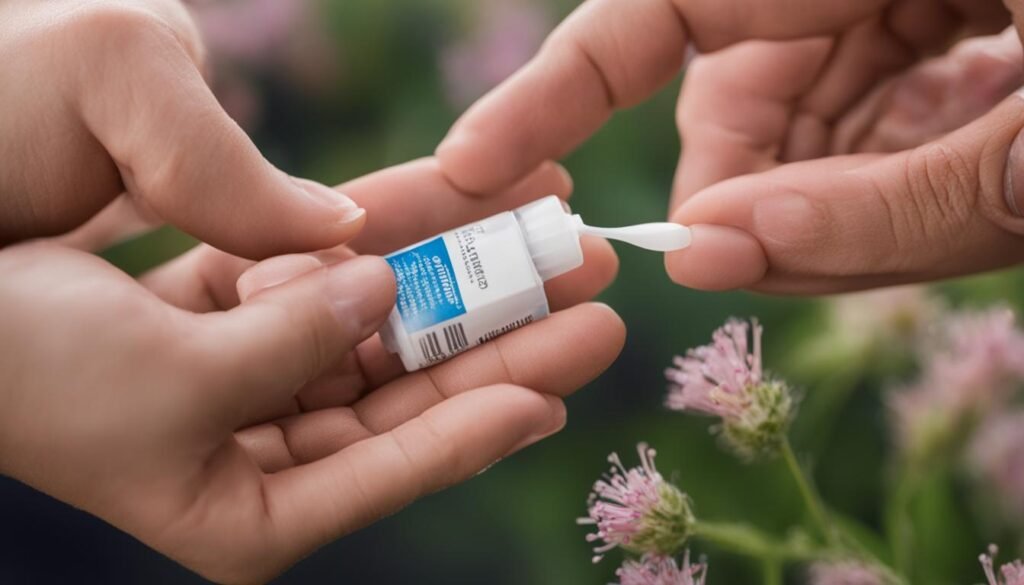How to treat hearing loss due to allergies is an important consideration for those experiencing auditory discomfort from allergic reactions. Allergens trigger the release of histamine in the body, leading to inflammation in the ear canal and Eustachian tube. This inflammation can cause conductive hearing loss by blocking sound waves. Fortunately, there are several effective treatments to manage and alleviate this type of hearing loss.
Preventing allergy flare-ups is a key approach in treating allergy-related hearing loss. Over-the-counter medications like Claritin, Allegra, and Zyrtec can help control symptoms and reduce inflammation. Natural remedies, such as taking hot showers and enhancing indoor cleaning practices, can also alleviate symptoms. Consulting a healthcare professional is crucial for accurate diagnosis and personalized treatment. They may recommend immunotherapy for long-term relief from allergy symptoms and hearing loss. Understanding the impact of allergies on hearing and the available treatment options can significantly improve your hearing health.

Key Takeaways:
- Prevent allergy flare-ups to manage allergy-related hearing loss
- Consider over-the-counter allergy medications for symptom relief
- Immunotherapy can provide long-term relief and reduce hearing loss caused by allergies
- Utilize natural remedies such as taking hot showers and improving indoor cleaning efforts
- Consult with a healthcare professional for a proper diagnosis and personalized treatment plan
Understanding Allergies and Hearing Loss
Allergies can significantly impact hearing, leading to allergy-induced hearing loss. This type of hearing loss occurs when a problem in the outer and middle ear prevents sound conduction. When exposed to an allergen, such as pollen or pet dander, your body releases histamine, which increases mucus production. This can cause fluid buildup in the middle ear, blocking the passage of sound waves and resulting in hearing loss.
Allergies can also affect your balance. Inflammation and fluid imbalance in the ear canal can disrupt the delicate mechanisms responsible for maintaining balance, leading to dizziness and vertigo.
Allergy-Induced Hearing Loss Treatment
To manage hearing loss caused by allergies, it is essential to address the underlying allergy symptoms. This can be done through various treatment options:
- Antihistamines: These medications help reduce histamine levels and relieve allergy symptoms, including swelling and mucus production.
- Decongestants: Decongestants can help open up congested nasal passages, improving airflow and reducing pressure in the ears.
- Allergy shots: Also known as immunotherapy, allergy shots can provide long-term relief from allergy symptoms and help prevent further hearing loss caused by allergies.
- Avoiding allergens: Minimizing exposure to allergens, such as dust mites, pollen, and pet dander, can help reduce allergy-related symptoms and prevent worsening of hearing loss.
If you are experiencing hearing loss due to allergies, it is important to consult with a healthcare professional for a proper diagnosis and personalized treatment plan. They can guide the most appropriate treatment options based on your specific situation.
Medications for Allergy-Related Hearing Loss
When treating hearing loss caused by allergies, several medications are available that can help reduce symptoms and improve overall hearing health. These medications target the underlying allergic reactions and can relieve allergy-induced inflammation in the ears.
Antihistamines
Antihistamines are a common over-the-counter medication used to alleviate allergy symptoms. They work by blocking the effects of histamine, a substance released by the body during an allergic reaction. By reducing histamine levels, antihistamines can help decrease swelling and relieve symptoms such as sneezing, itching, and running nose. By managing these allergy symptoms, antihistamines can indirectly help reduce hearing loss caused by allergies.
Decongestants
Decongestants are another type of medication that can be used to treat allergy-related hearing loss. They work by narrowing the blood vessels in the nasal passages, reducing congestion and relieving pressure in the ears. Decongestants can help improve hearing and alleviate symptoms such as ear pain and muffled sounds by clearing the nasal passages and reducing fluid build-up in the middle ear. It is important to note that decongestants should be used with caution and under the guidance of a healthcare professional, especially for individuals with certain medical conditions.
Allergy Shots (Immunotherapy)
In more severe cases of allergy-related hearing loss, allergy shots, also known as immunotherapy, may be recommended. Allergy shots work by gradually introducing small amounts of allergens into the body, helping the immune system build up tolerance over time. This can reduce the body’s allergic response and provide long-term relief from allergy symptoms affecting hearing. Allergy shots are typically administered by a healthcare professional and require a series of injections over a specific period of time.
Read Also: Should I go to urgent care for hearing loss
It is important to consult with a doctor or pharmacist before taking any medication for allergy-related hearing loss. They can guide the most suitable options based on individual symptoms and medical history. Additionally, it is important to follow the recommended dosage and usage instructions for each medication to ensure safety and effectiveness.

Home Remedies for Allergy-Related Hearing Loss
Aside from medication, several home remedies can help alleviate symptoms of allergy-related hearing loss. These remedies can be combined with medical treatments to relieve and support overall ear health.
1. Warm Compress
A warm compress or heating pad on the affected ear can help relieve ear pain caused by fluid build-up. Apply the warm compress or heating pad to the ear for 10-15 minutes. The gentle heat can help reduce inflammation and promote drainage of excess fluid, providing relief from discomfort.
2. Chewing Gum with Xylitol
Chewing gum that contains xylitol may help prevent ear infections by slowing the growth of bacteria. Xylitol is a natural sweetener that has been found to have antibacterial properties. By chewing gum regularly, especially after meals or when experiencing allergy symptoms, you can help keep your ears clear and reduce the risk of infection.
3. Sleeping Position
Adjusting your sleeping position can also help alleviate ear pain and support the immune system in fighting infections. Try sleeping upright or elevating your head to encourage proper fluid drainage and reduce ear pressure. This can help reduce discomfort and improve overall sleep quality.
4. Minimize Allergen Exposure
To reduce allergy symptoms and manage allergy-related hearing loss, minimising your exposure to allergens is important. Keep windows closed during high pollen seasons, use air purifiers to filter out allergens, and regularly clean your living space to remove dust, pet dander, and other potential triggers. Creating a clean and allergen-free environment can help reduce symptoms and promote better hearing health.
By incorporating these home remedies into your allergy management routine, you can complement medical treatments and alleviate symptoms of allergy-related hearing loss. However, consulting with a healthcare professional for a proper diagnosis and personalized treatment plan for your specific condition is important. With the right approach and a combination of medical and home remedies, you can effectively manage allergy-related hearing loss and improve your overall quality of life.

Conclusion
Allergies can significantly impact hearing, leading to conductive hearing loss and balance issues. Understanding the connection between allergies and hearing loss is crucial in finding effective treatment options. By managing allergy flare-ups and utilizing medications such as antihistamines and decongestants, symptoms can be alleviated, and hearing loss caused by allergies can be reduced. In severe cases, immunotherapy may be recommended for long-term relief.
Aside from medication, several home remedies can help alleviate allergy-related hearing loss symptoms. Warm compresses and chewing gum with xylitol can relieve ear pain and prevent infections. Elevating the head while sleeping and minimizing exposure to allergens can also support the immune system and reduce allergy symptoms. Additionally, running an air purifier and staying hydrated can improve hearing health.
Does sinus infection cause hearing loss? Explore the latest Insights
If you are experiencing hearing loss due to allergies, it is important to consult with a healthcare professional for a proper diagnosis and personalized treatment plan. Each individual’s condition is unique, and a healthcare professional can guide the most suitable approaches. By effectively managing allergies and exploring various treatment options, it is possible to treat and reduce hearing loss caused by allergies, improving overall hearing health and quality of life.
Frequently Asked Questions
What causes allergy-related hearing loss?
Allergy-related hearing loss is caused by inflammation in the ear canal and the Eustachian tube, triggered by the release of histamine in response to allergens.
How can I treat allergy-related hearing loss?
To treat allergy-related hearing loss, it is vital to prevent allergy flare-ups. Over-the-counter allergy medications such as Claritin, Allegra, and Zyrtec can help manage symptoms. In severe cases, immunotherapy may be recommended. Home remedies such as taking a hot shower and improving indoor cleaning can also reduce hearing loss symptoms.
What medications can help with allergy-related hearing loss?
Over-the-counter allergy medications such as antihistamines and decongestants can help alleviate allergy symptoms that can interfere with hearing. Combination medications that include both antihistamines and decongestants are also available. It is important to consult with a doctor or pharmacist before taking any medication.
Can home remedies help alleviate allergy-related hearing loss?
Yes, some home remedies can help alleviate symptoms of allergy-related hearing loss. A warm compress or heating pad can help relieve ear pain caused by fluid build-up. Chewing gum that contains xylitol may help prevent ear infections. Sleeping upright or elevating the head while sleeping can also help alleviate ear pain and support the immune system in fighting infections. Minimizing exposure to allergens, staying hydrated, and running an air purifier can also reduce allergy symptoms.
How can I manage allergy-related hearing loss effectively?
Understanding how allergies affect hearing and exploring treatment options such as medication, immunotherapy, and home remedies can effectively manage allergy-related hearing loss. Consulting with a healthcare professional for a proper diagnosis and personalized treatment plan is important.



